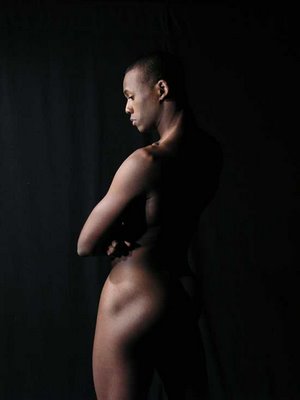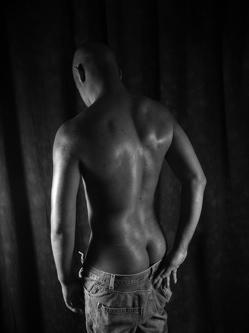 GABORONE, BOTSWANA - They slipped in the door one by one, their faces a mix of apprehension and excitement. Sensing safety, their shoulders relaxed a little; one man permitted himself an experimental giggle, a couple of women exchanged slow and sidelong glances.
GABORONE, BOTSWANA - They slipped in the door one by one, their faces a mix of apprehension and excitement. Sensing safety, their shoulders relaxed a little; one man permitted himself an experimental giggle, a couple of women exchanged slow and sidelong glances.It was the bimonthly meeting of Legabibo — Lesbians, Gays and Bisexuals of Botswana — and just attending this gathering, in a drab conference room on the edge of the city, was an act of courage. Homosexuality is illegal in Botswana, as it is in most other sub-Saharan African countries. And while no one could get arrested for attending a meeting (you'd have to be caught having sex for that), just showing up at Legabibo is enough to risk ostracism and family shame. The threat of physical violence is pervasive, too.
"People say things to us like, 'Are you crazy, do you think we have such people in Botswana?'" sighed Prisca Mogapi, 25, who heads the group. "They say, 'Being homosexual is something you adopt from people in European countries.' And I have to tell them that it has been in Botswana through history. That you have always had women forced into marriages, but they have had secret relationships. That it's nature and they have to accept these people."
When Ms. Mogapi and her partner invited friends to a party to celebrate their relationship a few months ago, a local newspaper reporter sneaked in with a camera, then published a lengthy exposé about how they danced, drank and ate cake. The word "disgusting" appeared in almost every paragraph. "I wasn't surprised someone could be so horrible," Ms. Mogapi said.
Legabibo, which counts 30 members brave enough to sign up by name, has been trying since 2004 to become a registered organization in Botswana; the government is having none of it. A recent court case — the appeal of a man convicted of having sex with a male partner — refused to even entertain the legality of the ban on same-sex relations, saying Botswana's society was "not ready" to discuss such issues.
So Legabibo is mounting a heightened public-awareness campaign, paying a local newspaper to run a weekly question-and-answer column (sample: are some people born gay just like some are born straight?) and sending thick-skinned members to appear on call-in radio shows.
"There comes a time when you know talking to people will not force them to change and you have to confront them — so we have to make us as visible as possible," said Monica Tabengwa, 35, the group's founder. A human-rights lawyer, Ms. Tabengwa is hoping that the next people charged for having sex will let her fight their case to the high court. "We need to force the issue, that's what they did with women's rights."

Legabibo is isolated in Botswana, but has comrades-in-arms across the continent. Next door in South Africa, equality for people of all sexual orientations was enshrined in the postapartheid constitution, and these days every city has a Gay Pride parade. Last December the high court ruled that a ban on gay marriage was unconstitutional, giving the government a year to rewrite the marriage law.
Yet even there, pervasive hostility to gay men and women endures in many quarters. In February, for example, Zoliswa Nkonyana, 19, was beaten to death by a mob with bricks and clubs near Cape Town because she went public about her lesbian identity.
In Nigeria, the government recently put forward a bill that would prohibit any public display of a "same-sex amorous relationship" and proposes five years in prison for anyone who "goes through the ceremony of marriage with a person of the same sex," "performs, witnesses, aids or abets the ceremony of same-sex marriage," or "is involved in the registration of gay clubs, societies and organizations." Only one gay group in Nigeria spoke out in public protest.
Like most other countries, there is a broad gulf in Botswana between what is acceptable in urban areas and in rural. Across Africa, the fight for gay rights clashes with devoutly religious societies, either Christian or Muslim.
In its initial attempts to register as a society, Legabibo was told that a gay group would potentially be guilty of "aiding and abetting an illegal act." Without registration, the group cannot apply for donor funding. Homophobic government representatives use the lack of official paperwork as a way to keep Legabibo members from participating in public events, Ms. Mogapi said.
Interestingly, it is HIV-AIDS — almost entirely a heterosexual disease in Africa — that has spurred some openness on traditionally taboo topics. The public health imperative has obliged governments to deal frankly with prostitution (illegal but widely practised) and the sexual activities of marginalized communities in order to stop the spread of the disease.
At their most recent meeting, Legabibo members decided to try a petition, asking people if they were in favour of changing the law against gay relationships, and to send members on a "study tour" of Cape Town, which has a thriving gay culture. Several members, most of them university and high-school students, also swapped phone numbers or had quiet conversations about what they tell their families.
"I've always been the only one," said one young woman who sought out the meeting after she read the newspaper column. "It's sort of weird to be in this room with these people — I guess they're all gay, too. I didn't know we had this in Botswana."
from The Globe And Mail
No comments:
Post a Comment